Contents
Stomach pain, nausea, a feeling of heaviness or heartburn are all possible manifestations of gastritis. In an acute process or in the stage of exacerbation of chronic inflammation, it is important to choose the best gastritis pills to alleviate the condition.
The stomach is one of the main organs of the digestive system. It is located in the abdomen just below the ribs. Swallowed food mixes with gastric juices containing enzymes and hydrochloric acid. The mucous membrane of the stomach, called the epithelium, is multi-layered. The epithelium is covered with mucus, which is produced by special glands. The balance between the production of aggressive digestive juices and the protection of the mucous membrane from aggression allows us to feel good. If the synthesis of acid and enzymes is impaired or there is not enough protective mucus, inflammation occurs. This is gastritis – a lesion of the gastric mucosa.
Gastritis is a term commonly used by patients and physicians to describe episodes of stomach discomfort (usually after eating), sometimes associated with nausea or vomiting. We also sometimes refer to this condition as indigestion. Strictly speaking, however, gastritis is the formal medical term for a diagnosis made by a pathologist when a biopsy taken during an endoscopy shows signs of inflammation and damage to the gastric mucosa. And it may seem strange, but in the true use of this term, there are usually no episodes of indigestion. There are two types of gastritis, acute and chronic.
What is acute gastritis?
Acute gastritis means a sudden inflammation of the gastric mucosa, which is caused by aggressive factors. When a gastroenterologist performs an endoscopy, the mucosa appears reddened and many acute inflammatory cells (mostly white blood cells) are seen in the specimens. There may be small, shallow tears in the mucosal surface, called acute erosions (“erosive gastritis”), and even tiny areas of bleeding.
What is chronic gastritis?
Chronic gastritis refers to long-term but mild inflammation and damage to the stomach lining. The gastric mucosa thins as normal cells are destroyed. Inflammatory cells include lymphocytes, which indicate an immune response. This is a very common disease. If gastritis is present for many years, mucosal changes can progress to a stage called metaplasia, with a slight increase in the risk of stomach cancer.
Any form of gastritis requires adequate treatment, and gastritis pills may be needed that eliminate inflammation, protect the mucous membrane from irritation, eliminate excess acid, or help suppress infection, as one of the key inflammation problems.
https://www.youtube.com/watch?v=lVCFsafYejA
Top 5 pills for gastritis
In the treatment of gastritis, various medicines are used that have a different spectrum of action. Often, doctors prescribe several drugs at once, aimed at different mechanisms of inflammation. We will discuss the most prescribed medicines for gastritis.
Gastrofarm
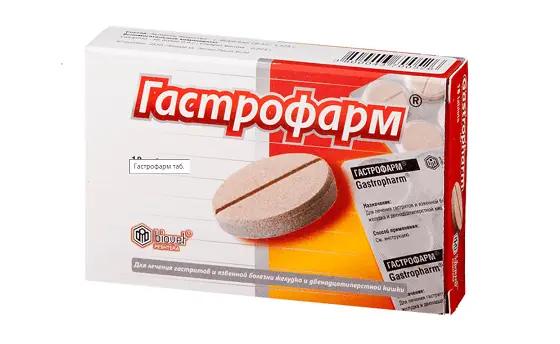
Gastrofarm has a protective effect on the mucous membrane of the stomach and intestines due to lactobacilli in the composition. It is they who produce lactic acid, which is involved in the regeneration of the mucosa. Quite often, it is prescribed if the patient is taking medications that adversely affect the gastrointestinal tract.
Indicated for use with:
- acute and chronic forms of gastritis;
- stomach and duodenal ulcers.
Release form – tablets that must be chewed or dissolved in water after grinding. Allowed for children over 3 years old. There are no contraindications for use.
Vikalin
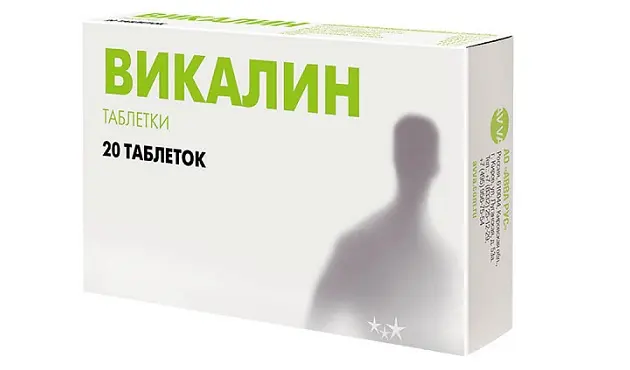
The release form of the drug is coated tablets, sold by prescription. The medicine has a combined effect due to the combination of components of plant origin and bismuth compounds. The preparation contains bismuth subnitrate, calamus rhizomes, buckthorn bark, magnesium carbonate, sodium bicarbonate, rutoside. The drug has an antacid (quenching acid), antispasmodic, astringent and laxative effect. Helps in the healing of damaged gastric mucosa.
The drug is used:
- with peptic ulcer of the stomach and intestines;
- with hyperacid gastritis;
- with dyspepsia.
Among the contraindications, attention should be paid to the ban on admission in children under 18 years of age, pregnant and lactating women. You can not drink medicine for gastritis with low acidity, with kidney failure and enterocolitis, appendicitis. Side effects include allergies and diarrhea.
Gastal
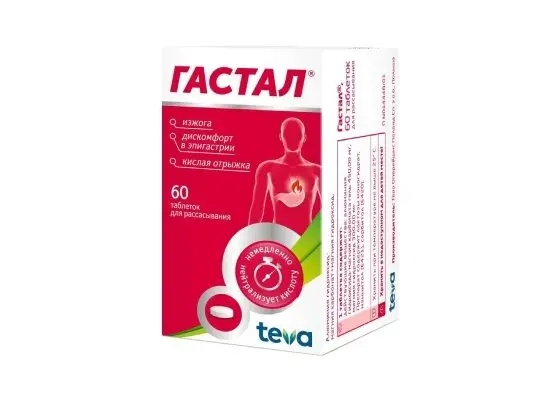
As part of the complex therapy of gastritis, the drug Gastal can be used. The active ingredients of this remedy are aluminum hydroxide-magnesium carbonate gel and magnesium hydroxide. It helps to reduce the increased acidity of gastric juice to normal levels.
Indications for use:
- discomfort or pain in the epigastrium, heartburn, sour belching;
- stomach ulcer,
- gastritis,
- reflux esophagitis,
- hiatal hernia.
Release form – tablets. Contraindicated in case of hypersensitivity to the components of the drug, severe renal failure, lactose intolerance, lactase deficiency, as well as children under 6 years of age. With caution: in chronic renal failure, pregnancy and during breastfeeding.
Rennie
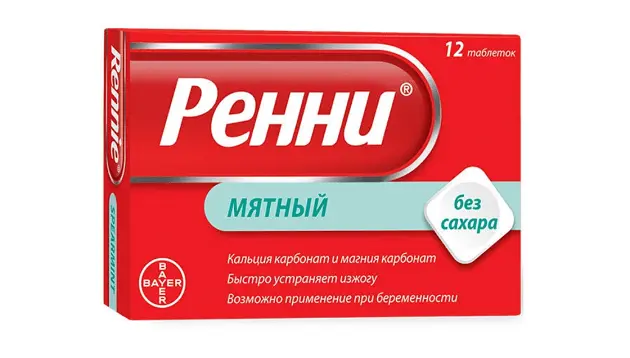
This remedy is available in the form of tablets for slow dissolution in the mouth. It can be bought at a pharmacy without a prescription. The medicine belongs to the category of antacids, that is, it suppresses the activity of hydrochloric acid, which the stomach produces in excess. Due to its active ingredients – calcium carbonate and magnesium carbonate, the drug binds an excess amount of hydrochloric acid, which helps to soothe the irritated mucosa.
The drug is used:
- to eliminate heartburn with gastritis with high acidity;
- with dyspepsia with discomfort;
- in violation of the diet with irritation of the walls of the stomach;
- in the complex treatment of ulcers.
Among the contraindications are allergy to components, serious kidney disease, excess calcium and lack of phosphorus in the blood, urolithiasis, age up to 12 years, galactose and lactose intolerance.
De-Nol
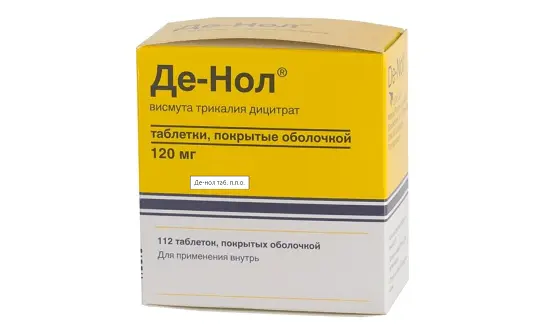
The medicine is produced only in the form of tablets, sold according to the prescription of a specialist. The drug is classified as a group of gastroprotective drugs, the active ingredient is bismuth quotes. When taken orally, the drug creates a thin protective film on the surface of the stomach. It also has antimicrobial activity against Helicobacter, which provokes gastritis and ulcers, has an astringent, anti-inflammatory effect. Helps protect damaged areas of the mucosa from the aggression of gastric juice.
Indications for admission:
- dyspepsia;
- ulcer of the stomach or intestines;
- gastritis with increased acidity;
- irritable bowel syndrome.
It is important to take into account possible contraindications to taking the medicine – these are severe kidney damage, pregnancy, subsequent breastfeeding. Side effects include discomfort in the digestive tract, rashes and headaches.
How to choose pills for gastritis
It is important to consult a doctor, only a specialist can make a correct diagnosis and choose a drug for the treatment of various forms of gastritis. Therapy varies depending on whether it is an acute process or a chronic one.
Treatment of acute gastritis
Obviously, the most important part of treating acute gastritis is to remove the irritant when it is found. Simple antacid drugs, more potent histamine H2 receptor antagonists, or proton pump inhibitors are helpful in reducing the amount of acid in the stomach. Nausea medication may be needed.
Consultation with a physician for further investigations and more advanced treatments will be necessary if symptoms do not resolve quickly or if vomit contains blood. When Helicobacteriosis is diagnosed, treatment includes antibiotics, often in combination with bismuth preparations for up to two weeks. Most cases resolve quickly if the irritant or infection is removed.
Chronic gastritis treatment
Eliminating any causative infection (usually Helicobacter pylori) with antibiotics is important to prevent progression of chronic gastritis, but the stomach lining rarely returns to normal. Vitamin B12 deficiency is treated with intermittent injections.
Patients with severe mucosal changes (i.e., precancerous changes in the gastric mucosa) may need an upper endoscopy every year to identify and treat lesions that may develop into cancer.
Popular questions and answers
We asked questions about the causes of gastritis and their elimination gastroenterologist, therapist Vera Samsonova.
Why can there be gastritis?
Chronic gastritis usually results from Helicobacter pylori infection. In our country, the infection is present in about 20% of children, and in more than 50% of adults and the elderly. Adult infection rates in underdeveloped countries can be as high as 90%.
Other causes of chronic gastritis may include:
● autoimmune disease;
● specific rare infections (ie HIV/AIDS);
● Crohn’s disease;
● gastric operations that increase the impact on the stomach of bile entering it.
What to do if you have gastritis?
● nausea and vomiting, severe bloating with flatulence;
● weight loss or lack of appetite.
In the vast majority of cases, chronic gastritis causes no symptoms. When mucosal damage is severe and prolonged, the stomach loses its ability to produce acid. This can cause indigestion. It also loses the ability to secrete a substance called intrinsic factor, which is essential for the absorption of the important vitamin, B12. Vitamin B12 deficiency eventually leads to a condition called pernicious anemia.
When the symptoms of acute gastritis are bright enough, you need to see a doctor. The diagnosis can usually be made based on the medical history. However, direct examination of the gastric mucosa with EGD is needed when the problem persists or bleeding occurs. Inflammatory changes are usually limited to the stomach. Other tests, such as blood tests, X-rays, and scans, are usually not performed unless an alternative condition is suspected during the examination.
When should you call an ambulance?
● vomiting with blood, black stools;
● persistent nausea with vomiting and weight loss;
● severe malaise, dizziness, loss of consciousness.
Can I treat myself?
Medications – Tablets are available to reduce the amount of acid in the stomach. You may need to take these medicines for several weeks or months, depending on your situation.
Dietary modifications – such as limiting or avoiding alcohol and caffeine, which can irritate the stomach lining.









